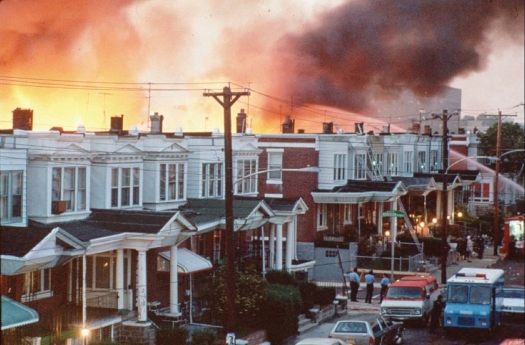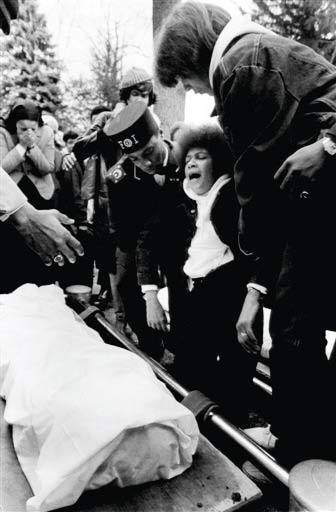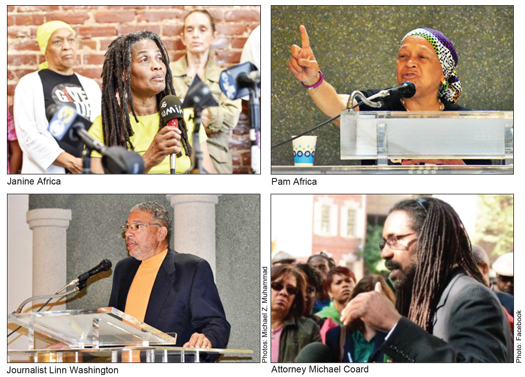After 35 years, memory of MOVE bombing still raw and fresh
By Michael Z. Muhammad -Contributing Writer- | Last updated: May 20, 2020 - 10:01:01 AMWhat's your opinion on this article?

Row houses in Philadelphia burn after officials dropped a bomb on the MOVE house in this May 1985 photo from files. Ramona Africa, the lone adult survivor of the May 13, 1985 fire, and two other MOVE members sued the city of Philadelphia, and the former police and fire commissioners for financial damages.
|
PHILADELPHIA—On a bright spring day 35 years ago on Mother’s Day, a black state police helicopter hovered ominously over a row home on a tiny block, at 6221 Osage Ave., like a vulture over its prey before dropping a C4 bomb onto the besieged house where men, women, and children lay hunkered down in the basement.
The aftermath of the May 13, 1985, airstrike against MOVE, a Black Revolutionary group, known for promoting healthy family and environmental justice, will forever be remembered as the darkest day in Philadelphia history as 11 people: adults CP, Conrad, Frank, John, Rhonda, Teresa, and children Tomasa, 7, Delicia, 9, Phil, 10, Netta, 11, and Tree, 13, all using the surname “Africa,” were killed. Additionally, a Philadelphia neighborhood burned down, leaving 61 homes destroyed, and more than 250 mostly Black residents homeless.

Louise James, sister of MOVE founder John Africa, is helped away from a cloth-covered board containing her brother’s remains during a funeral at Whitemarsh Memorial Park in Ambler, Pa., Dec. 5.
|
Today, decades later, this ominous and brutal chapter in American history is one that is not as widely known and taught about but is a grim and brutal reminder of the lengths a mayor and police department enacted that resulted in death and destruction.
“It seems incredible that so many people had never heard about the time American law enforcement bombed U.S. citizens on U.S. soil, which, on top of the deaths, left dozens of bystanders’ homes destroyed in an uncontrolled fire that the police commissioner told firefighters not to put out right away. The details are so extreme, so over-the-top. How have we forgotten this?” wrote Gene Demby in a 2015 article titled, “Why Have So Many People Never Heard Of The MOVE Bombing?”
The confrontation, according to Linn Washington, Temple University professor and noted journalist, was the result of complaints of harassment from neighbors who were on the receiving end of constant haranguing by MOVE members, he told The Final Call.
The organization was driven to the brink by constant police harassment, the killing of a MOVE infant and Life Africa in 1976 and the imprisonment of nine MOVE member who received 100-year sentences following a police confrontation in 1978 resulting in the death of a police officer, where thousands of gallons of water and tear gas was pumped into their home. Former Police Commissioner Frank Rizzo led the 1978 attack on the compound. He served as commissioner from 1968 to 1971 and mayor of Philadelphia from 1972 to 1980. As police commissioner he had a notorious reputation for heavy-handed tactics and was a force of fear and oppression in the Black community, noted a 2017 Philadelphia Inquirer article.
When MOVE member Delbert Africa emerged from the house, police beat him viciously. Members who were subsequently incarcerated became known as the MOVE 9.
Conflicts and clashes
“The word MOVE is not an acronym. It means exactly what it says: MOVE, work, generate, be active. Everything that’s alive moves. If it didn’t, it would be stagnant, dead,” notes the group’s website On The MOVE. What were their alleged crimes? This was addressed in a story written by Amy Nicole for UltraCuture. She writes: “They were raw vegans, protesting zoos and pet shops, taking in stray animals, composting, homeschooling and preaching about the sacredness of life in the middle of a city that had no time to listen.”

|
The organization was founded by John Africa, who was born Vincent Leaphart, noted Ms. Nicole. He adopted the surname of Africa in reference to the place he believed all life originated, she continued. “All MOVE members adopted the Africa surname, wore their hair in natural dreadlocks, and eschewed modern conveniences, drugs, alcohol, and any chemicals, including birth control,” she writes. “He preached reliance on the self, deep respect for every living being, natural law, natural living practices, and vigorous health through exercise and raw foods, including birth control.”
Mr. Washington said, “MOVE had a strategy; that was to get their members out of jail. They used the neighbors with the thought they would become so outraged they would put pressure on elected offices to free their jailed members,” reflecting on what lead up to the 1985 bombing.
Following the May 13 attack, only Ramona Africa and 13-year-old Birdie Africa, aka Michael Moses Ward, survived. Ramona Africa has stated in many interviews the police shot at members who tried to come out of the home that turned into a fiery furnace. “We were left with three alternatives,” she stated, “Choke to death or burn alive or possibly shot to death.”
In an email to The Final Call, Attorney Michael Coard stated, “The official report by the city’s own Medical Examiner provides proof from the autopsies of six of the 11 dead—namely Tomasa, Delicia, Phil, Netta, Tree, and Rhonda—that they did not die inside from flame-fire but died outside from gunfire.”
Despite two grand jury investigations and a commission finding that top officials were grossly negligent, no one from the city government was criminally charged. The bombing happened on the watch of Wilson Good, Philadelphia’s first Black mayor. In the aftermath, the then-mayor stated he did not know about the details of the plans in advance, contradicting accounts that said he gave permission for authorities to carry out the assault.
Mr. Goode is currently calling for the city to follow his lead and apologize to MOVE. An op-ed written for British Newspaper The Guardian, titled: “When I was mayor, Philadelphia bombed civilians. It’s time for the city to apologise,” former-Mayor Goode writes, “The event will remain on my conscience for the rest of my life.”
“This is the fourth time I’ve publicly apologized. Today I would like to apologize again and extend that apology to all who experienced, and in many cases continue to experience, pain and distress from the government actions that day,” he wrote in the article published May 10.
“But there’s something more I want to suggest on this important anniversary. After 35 years, it would be helpful for the healing of all involved, especially the victims of this terrible event, if there was a formal apology made by the City of Philadelphia.”
This sentiment appears to be picking up steam with a recent editorial by The Philadelphia Inquirer. “Acknowledging mistakes is a powerful way to move forward and to demand change—even if those mistakes were made by someone else,” the editorial board wrote. Eleven members of Philadelphia City Council have called to make May 13 an annual day of reflection.
Philadelphia City Council members Jamie Gauthier, Kendra Brooks, Helen Gym, Allan Domb, Isaiah Thomas, Katherine Gilmore Richardson, Mark Squilla, Curtis Jones, Jr., Maria Quiñones-Sánchez, Kenyatta Johnson and Cherelle Parker, issued a public statement on May 13.
“We apologize for the decisions leading to the devastation of that day, and acknowledge the fundamental injustice, cruelty, brutality, and inhumanity of the MOVE bombing. As members of Council, we acknowledge the significant failures in communication, negotiation, and conflict resolution leading up to and following these tragic events,” the statement read in part. The members plan to formalize the apology with a council resolution later this year.
Mayor Goode has made public apologies but none directly to MOVE. Former Pennsylvania Governor Ed Rendell, who as district attorney prosecuted MOVE members, said in published reports he now regrets the severity of the sentences he pursued for those who were not leaders of the group.
Is an apology enough?
Mr. Washington said he was supportive of a city apology. An apology is needed from MOVE to neighbors and anyone who was harmed by the event, he said. “The city definitely needs to apologize,” he told The Final Call. “For the years of oppression, they visited on MOVE as well as MOVE who terrorized their neighbors. MOVE made war on Black people resulting in adverse consequences on those people,” he argued.
To commemorate the tragedy, MOVE provided their narrative on WURD radio with a day-long event titled “Remember MOVE on WURD” presented by Ulysses “Butch” Slaughter and Brother Shomari. According to information on the WURD website, “The day-long broadcast featured an in-depth examination of the Philadelphia phenomenon that continues to test the soul of the City. On the 35th anniversary of the tragic MOVE bombing, the conversations featured new insights on this timeless story.”
Pam Africa, MOVE member and Minister of Confrontation, in a lengthy interview with The Final Call stated MOVE was not interested in an apology. “We were the victims,” she pointed out.
“Our family was murdered by the city. Currently, family members are on lengthy parole after serving an inordinate amount of time in jail. If the city wants to do anything, it should free our family members from the inordinate parole stipulations,” she said.
“Were there problems between MOVE and the neighbors, yes the f**k it was,” said Pam Africa. “Were we on the bull horn in the evening and late at night yes the f**k we was. That was our defense. We wasn’t shooting nobody,” she said.
Janine Africa, a recently released MOVE 9 member, participated in the WURD broadcast. She agreed with Pam Africa. She reminisced about the bombing. A matron came to her cell and coldly told her that her child, 10-year-old Phil Africa, just died. “We need to have the parole stimulations removed, not an apology,” said Janine Africa.
Throughout the WURD commemorative event, the reoccurring theme was the need for justice.
Currently, Philadelphia Mayor Jim Kenny and City Council President Darrell Clark have not responded to the call for an official apology. Attorney Coard pointed out that, “The city apparently believes that an unconditional and complete apology could possibly open the door to criminal liability because there is no statute of limitations for murder.”
“An apology is empty without change,” said Mr. Washington. “As long as the Philadelphia Police Department remains racist and lawless, an apology will do nothing. As long as the justice system will bend and break the law to sustain the status quo, it will mean nothing, not doing anything about the employment situation, allowing the school system to fall down, poor housing; an apology means nothing,” he said.
“There has to be a structural and substantial change, or this will be nothing more than an empty exercise,” he added.
Gerald Renfro, a resident on that infamous day, who still remains on the former bombed-out block, had a harsher opinion regarding justice. He concluded in his WURD radio interview that: “Justice will only be served if those involved including Mayor Goode pay for the crimes committed and go to jail.” (Final Call staff contributed to this report.)
INSIDE STORIES AND REVIEWS
-
-
About Harriett ... and the Negro Hollywood Road Show
By Rabiah Muhammad, Guest Columnist » Full Story -
Skepticism greets Jay-Z, NFL talk of inspiring change
By Bryan 18X Crawford and Richard B. Muhammad The Final Call Newspaper @TheFinalCall » Full Story -
The painful problem of Black girls and suicide
By Charlene Muhammad -National Correspondent- » Full Story -
Exploitation of Innocence - Report: Perceptions, policies hurting Black girls
By Charlene Muhammad -National Correspondent- » Full Story -
Big Ballin: Big ideas fuel a father’s Big Baller Brand and brash business sense
By Bryan Crawford -Contributing Writer- » Full Story






 Click Here Stay Connected!
Click Here Stay Connected!








